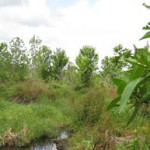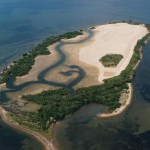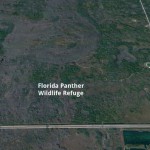Kevin Erwin Consulting Ecologist, Inc. (KECE) specializes in large-scale ecological restoration. He currently serves as President of the Large-Scale Ecological Restoration Section (LERS) for the Society of Ecological Restoration (SER). Projects have included locating, designing, permitting, construction oversight, and management of restoration sites for climate mitigation, source water conservation, watershed management, net environmental benefits, and conservation. Kevin Erwin’s ecological restoration expertise has been applied to projects throughout the world (jump to international projects or Florida projects).
International Projects
An interactive map of our international projects is also available.
Wetland Restoration Guidelines
International
Kevin Erwin was part of an international team of experts that produced new guidelines for the Ramsar Convention on Wetlands regarding wetland restoration to be used by 159 contracting parties (countries) including managers of Ramsar sites as a member of the Ramsar Scientific, Technical, and Review Panel (STRP) in Gland, Switzerland from 2008 to 2012.
Restoration of Coastal Wetlands Following 2004 Indian Ocean Tsunami
At the request of IUCN, Kevin Erwin coordinated the ecological assessments and wetland restoration following the tsunami. 2004-2005.
Putrajaya Wetland and Lakes
Malaysia
Evaluated and modified as appropriate the design and construction of the first created wetlands in Malaysia located in the new Federal Government Administrate Centre of Putrajaya. 1995-1998.
Potential Wetland Reclamation and Restoration of Ranger Uranium Mine in Kakadu National Park
Australia
Advised client on impacts resulting from current resulting from current reclamation practices and appropriate techniques for restoration and management of wetlands. 1995.
Temperate Wetland Restoration Course
Canada
Kevin Erwin designed temperate wetland restoration and water mangement courses in Ontario and Nova Scotia, and was the lead instructor from 1995 to 2010, using field sites for group training exercises, and advises agencies on wetland restoration and watershed management issues.
Peoples Republic of China
Kevin Erwin has worked extensively throughout the PRC since 1992, most recently as a DeTao Master of Ecological Restoration. His work includes ecological assessments, development of ecological restoration plans, watershed management, and lecturing and teaching at universities throughout the country including; Tsinghua University, Peking University, Zhejiang University, Shanghai Jiao Tong University, Chinese Academy of Sciences, Fudan University, Nanjing University, Huazhong University of Science and Technology, Hunan University, Tongji University, Beijing Institute of Technology, Beijing Normal University, and Chongqing University to name a few.
Florida Projects
An interactive map of our projects across the state of Florida is also available.
Little Pine Island Regional Mitigation Bank
Lee County, Florida
KECE ecologists conducted detailed assessments of the drained and exotic infested 4,700 acre island. An innovative restoration methodology was developed by KECE that allowed for the removal of exotic trees without impacts to the remaining native vegetation. Monitoring and management oversight continues to assure and document success. 1997-present.
Manatee 1 Mitigation and Net Environmental Benefit Site
Manatee County, Florida
Restoration of a 200 acre site which historically had been impacted by farming activities and drainage. KECE devised a restoration methodology to enhance site hydrology, to enhance native habitats through exotic removal and native plantings, and convert agricultural fields to scrubber marshes to provide a buffer to enhanced native lands and provide for water quality improvements for surrounding agricultural runoff. 2004-present.
Lake Wales Forest Mitigation and Net Environmental Benefit Site
Polk County, Florida
 On this 400 acre site, KECE designed the restoration methodology to restore site hydrology through a series of structures and to restore native habitats through planting and exotic vegetative management. The project includes over 160 acres of wetland forest restoration, 14 acres of freshwater marsh restoration, 37 acres of native wetland enhancement, and over 184 acres of upland restoration including 87 acres of scrub habitat. 2004-present.
On this 400 acre site, KECE designed the restoration methodology to restore site hydrology through a series of structures and to restore native habitats through planting and exotic vegetative management. The project includes over 160 acres of wetland forest restoration, 14 acres of freshwater marsh restoration, 37 acres of native wetland enhancement, and over 184 acres of upland restoration including 87 acres of scrub habitat. 2004-present.
Port Manatee Spoil Island Restoration, Lower Tampa Bay
Manatee County, Florida
 Project included restoration and grading of a 60 acre dredge spoil island to re-establish ground nesting shorebird habitat, create mangrove wetlands, and enhance the existing mangrove and coastal habitat. 1999-2001.
Project included restoration and grading of a 60 acre dredge spoil island to re-establish ground nesting shorebird habitat, create mangrove wetlands, and enhance the existing mangrove and coastal habitat. 1999-2001.
Florida Panther National Wildlife Refuge
Collier County, Florida
 During the 1980’s, conservation biologists, state and federal wildlife agencies were assessing the condition of a dwindling population of Florida panthers, approximately 30 at the time. In the mid-1980’s, having recently completing panther surveys in south Florida totaling over one-hundred thousand acres, Kevin Erwin entered into discussions with the U.S. Fish and Wildlife Service (USFWS), Florida Game and Freshwater Fish Commission and major land owners in South Florida to determine a course of action.
During the 1980’s, conservation biologists, state and federal wildlife agencies were assessing the condition of a dwindling population of Florida panthers, approximately 30 at the time. In the mid-1980’s, having recently completing panther surveys in south Florida totaling over one-hundred thousand acres, Kevin Erwin entered into discussions with the U.S. Fish and Wildlife Service (USFWS), Florida Game and Freshwater Fish Commission and major land owners in South Florida to determine a course of action.